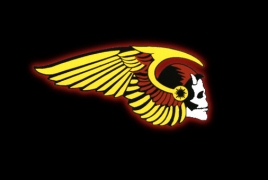
A vet named Otto Friedli is credited with starting the club after breaking from one of the earliest postwar motorcycle clubs, the Pissed Off Bastards, in the wake of a bitter feud with a rival gang, Time says. "Hell's Angels" was a popular moniker for bomber squadrons in World Wars I and II, as well as the title of a 1930 Howard Hughes film about the Royal Flying Corps. For years, the HAMC, as members refer to the group, remained a California organization; the first chapter to open outside the state started in Auckland, New Zealand, in 1961.
In 1969 the first European Hells Angels charter was accepted in London, England. Today, there are more than 250 charters in Europe alone. In the late 1970s, Australian clubs were admitted and in 1984, Rio de Janeiro, Brazil became the first South American charter. In 1993, Hells Angels came to the African continent with a charter in Johannesburg, South Africa.
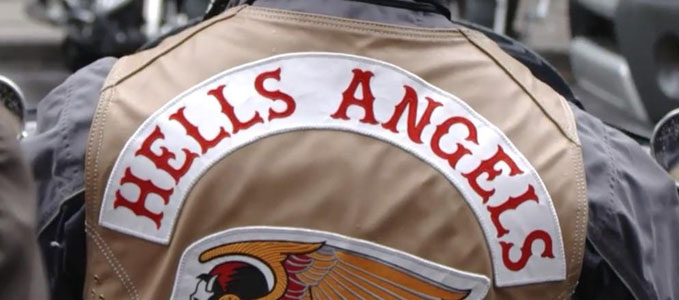
Today the Hells Angels Motorcycle Club has spread its wings all over the world: from Alaska and Norway in the high North, to South Africa and Argentina in the southern hemisphere, from the Caribbean Islands to Turkey, which became the first Muslim country to join the club in 2009.
The club has earned a reputation in media and popular culture, thanks to a number of high-profile raids and wars on its various national charters, and in no small part to Gimme Shelter, a 1970 documentary about a riot during a Rolling Stones concert. The Stones’ management allegedly paid the Hell’s Angels to provide security at the concert and paid them in beer, which was a terrible idea. As a banner once read on the club’s website, “when we do right, no one remembers; when we do wrong, no one forgets.”
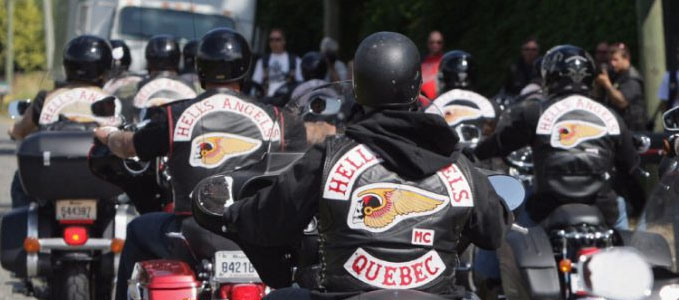
Members of the organization have continuously asserted that they are only a group of motorcycle enthusiasts who have joined to ride motorcycles together, to organize social events such as group road trips, fundraisers, parties, and motorcycle rallies, and that any crimes are the responsibility of the individuals who carried them out and not the club as a whole. However, numerous police and international intelligence agencies classify the Hells Angels as one of the "big four" motorcycle gangs, along with the Pagans, Outlaws, and Bandidos, and contend that members carry out widespread violent crimes, including drug dealing, trafficking in stolen goods, and extortion, and are involved in prostitution.
Members of the club have been accused of crimes and convicted in many host nations.
Australia
The Hells Angels' activities in Australia have traditionally included drug trafficking, prostitution, armed robbery, arms trafficking, fencing and murder-for-hire, but have more recently moved into legitimate businesses such as gyms, tattoo parlors, haulage companies, and the security industry. Police allege they use mainstream industries to launder existing funds and to exploit new income streams, using the strategies they developed during a series of gang wars to intimidate business competitors.
Germany
The first German charter of the Hells Angels was founded in the 1970 in Hamburg. In 1980, Hells Angels members murdered a nightclub manager on the island of Sylt. On August 11, 1983, 500 police officers stormed the clubhouse "Angels Place" in the red-light district Sternschanze and arrested the leaders of the Hells Angels of Hamburg. In 1986, thirteen members were sentenced between 6 months to 7 years in prison and the Hamburg charter and its symbols were banned. Despite the ban, today there is again a Hells Angels charter in Hamburg under the name of "Harbor City", because the association is not prohibited as such, but only wearing its symbols.
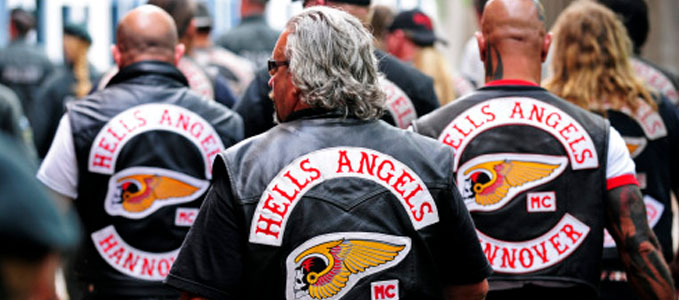
Netherlands
The Hells Angels control much of the drug trade in the Netherlands, and are also involved in prostitution. The Dutch police have stated that the Hells Angels smuggle cocaine into the country through terrorist organizations and drug cartels in Curaçao and Colombia, and also deal in ecstasy and illegal firearms.
Norway
Due to the extent of the criminal activities of HAMC in Norway, Kripos, the criminal investigation unit of the Norwegian police, considers the Hells Angels Motorcycle Club to be a criminal organization. In 2011 the presumed leader of HAMC Norway Leif Ivar Kristiansen was convicted of threats, robbery and severe drug crimes, and sentenced to four years and nine months in prison. In another case he was found guilty of fencing and tax evasion, and a number of smaller charges. According to numbers from Kripos in 2012, 120 Hells Angels-members have been convicted 400 times for about 1000 violations of the Norwegian penal code. The convictions include violence, rape, severe drug criminality and threats. In 2010, 2011 and 2013 the police conducted raids on the HAMC headquarters in Oslo and confiscated a number of illegal weapons in all the raids. The police demanded in October 2013 that the headquarters be seized as they believe the house is being used as a staging ground for organized criminal activities.
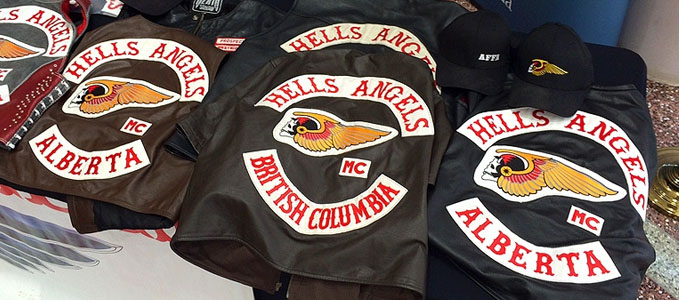
Spain
Spanish police carried out a number of raids against the club on April 21, 2009, arresting 22 members in Barcelona, Valencia, Málaga, Madrid and Las Palmas. Two of them were members of the club's Italian chapters. The Hells Angels arrested were charged with drugs and weapons trafficking, and extortion. Law enforcement seized military-style weapons and ammunition, bulletproof vests, a kilo of cocaine, neo-Nazi literature and €200,000 in cash during the searches of 30 properties.
Sweden
Sweden is home to twelve Hells Angels chapters with 170 members and 230 official supporters. In 2012, the Swedish television network TV4 compiled a report which alleged that the Hells Angels had been convicted of 2,800 crimes in the country, including 420 violent crimes.
Read also:World’s most dangerous gangs. Mungiki

